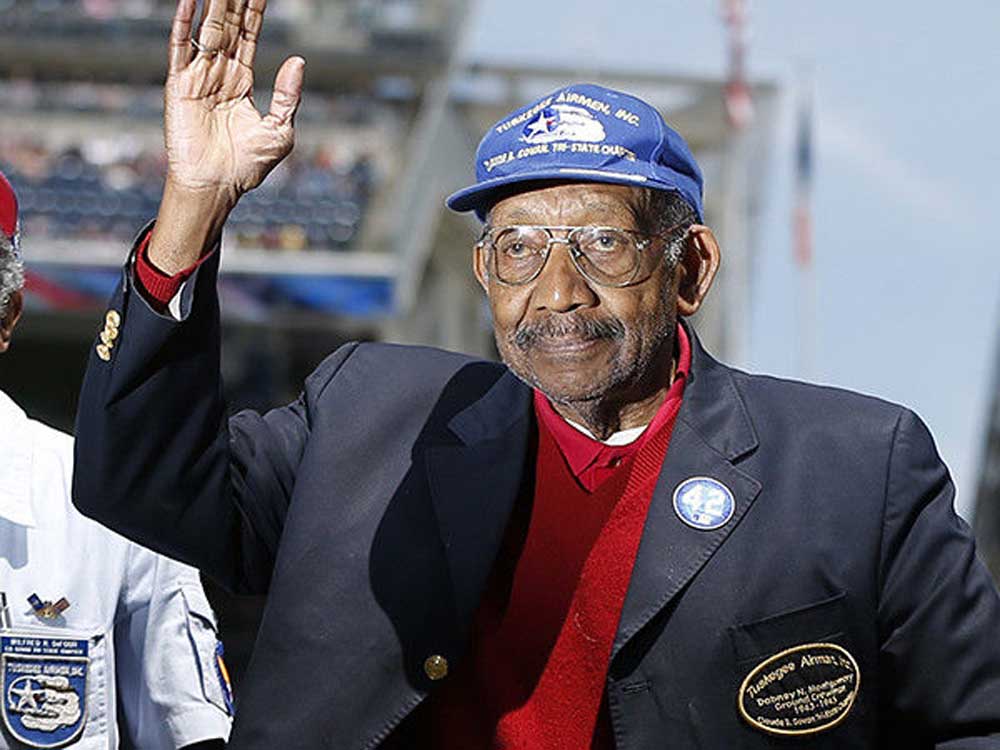Dabney Montgomery, Tuskegee Airman who guarded MLK Jr. on 1965 Selma to Montgomery march, dies at 93
Published 7:51 am Monday, September 5, 2016

- In this 2013 photo, Tuskegee Airman Dabney Montgomery waves to the crowd as he is introduced before the start of a baseball game between the New York Yankees and the Baltimore Orioles in New York. (AP Photo/Kathy Willens, FIle)
For Dabney Montgomery, the indignities at home stung more because of the noble tasks he had performed for his country abroad – serving with the Tuskegee Airmen to help win World War II in a role that would eventually earn him a Congressional Gold Medal.
But at a train station in Atlanta in 1945, carrying an army duffel bag over his shoulder after receiving his honorable-discharge papers, he was abruptly confronted with Jim Crow America.
“Before I could get in, a white officer threw up his hands (and said): ‘You can’t come in this door, boy, you got to go around the back,'” Montgomery told Alice Bernstein in a video interview. “‘You can’t come in here; you’re black. You got to go around the corner.'”
Montgomery, 93, died of natural causes Saturday morning, after serving as a member of the all-black fighter group and, decades later, as a bodyguard to Martin Luther King Jr.
Montgomery protected King during the famous 1965 march to Montgomery from Selma, Ala. – Montgomery’s home town.
Heels from the shoes Montgomery wore in that march will hang in the National Museum of African American History and Culture in Washington when it opens Sept. 24., according to the Smithsonian magazine.
Montgomery was born in 1923 and inducted into the armed forces in 1943, serving in what was then the Army Air Corps as one of the Tuskegee Airmen.
They got their name because they trained at Alabama’s historically black Tuskegee University, which had a civilian pilot training program, according to the university’s historical page about the airmen.
Black servicemen who trained at Tuskegee faced discrimination in the armed services and at home, but the “Red Tails,” as they were known, distinguished themselves in a March 1945 bombing run to Berlin and by discovering a German destroyer in the harbor of Trieste, Italy, according to the university.
“The tenacious bomber escort cover provided by the 332nd ‘Red Tail’ fighters often discouraged enemy fighter pilots from attacking bombers escorted by the 332nd Fighter Group,” the university said.
Despite the exploits of the airmen, Montgomery said he was often smacked in the face with discrimination at home.
Back in Selma fresh out of the army, he tried to register to vote, according to the Bernstein interview. A woman there, he said, told him that he had to find “three white men that would endorse me as a good negro that would not cause any trouble in Selma, Alabama, if I voted.” When he returned with the endorsements, he said, he was denied again. This time, the woman said, it was because he didn’t own land in Alabama.
But as he left, he noticed a white soldier, fresh out of the army just like he was.
“He walked up to the table: ‘I want to vote.'” Montgomery recalled the man saying.
He said the lady replied, “‘OK, sign your name here. Right here. OK. You can vote.'”
“That was the welcome that so many of us (blacks) received after fighting World War II,” Montgomery recalled.
The memory stuck. Years later, after he had relocated to New York, he saw newscasts of civil rights activists being attacked with firehoses and tear gas. He decided to return to do his part.
“I’m going and getting a taste of that gas,” he recalled telling his supervisor. “I’m going home and (taking) part in that movement.”
Alongside King, he prayed on the steps of the Selma courthouse and, later, walked 50 miles to Montgomery.
His contributions were recognized later in life. In 2007, President George W. Bush awarded him the Congressional Gold Medal.
He worked for the New York City Housing Authority and as a volunteer outreach worker for a nonprofit that assists the elderly, according to the Associated Press.
“Montgomery remained active until his final weeks, frequently visiting schools to talk to children about his experiences growing up in Alabama, serving in the war and marching for civil rights,” the AP reported.
“He just loved motivating young people to be somebody,” his wife, Amelia Montgomery, told the AP. “That was his joy.”
In the interview with Bernstein, he talked about one final vindication.
He’d broken color barriers in the armed forces and marched with King, doing his part to give black Americans the right to vote. And on returning to Selma, he took a trip to the place where he had been denied that right.
“When I went down to that room, a black woman was sitting behind the desk where (I was told) ‘No, you cannot vote,'” he recalled. “That was my revenge.”
—
(c) 2016, The Washington Post · Cleve R. Wootson Jr.






